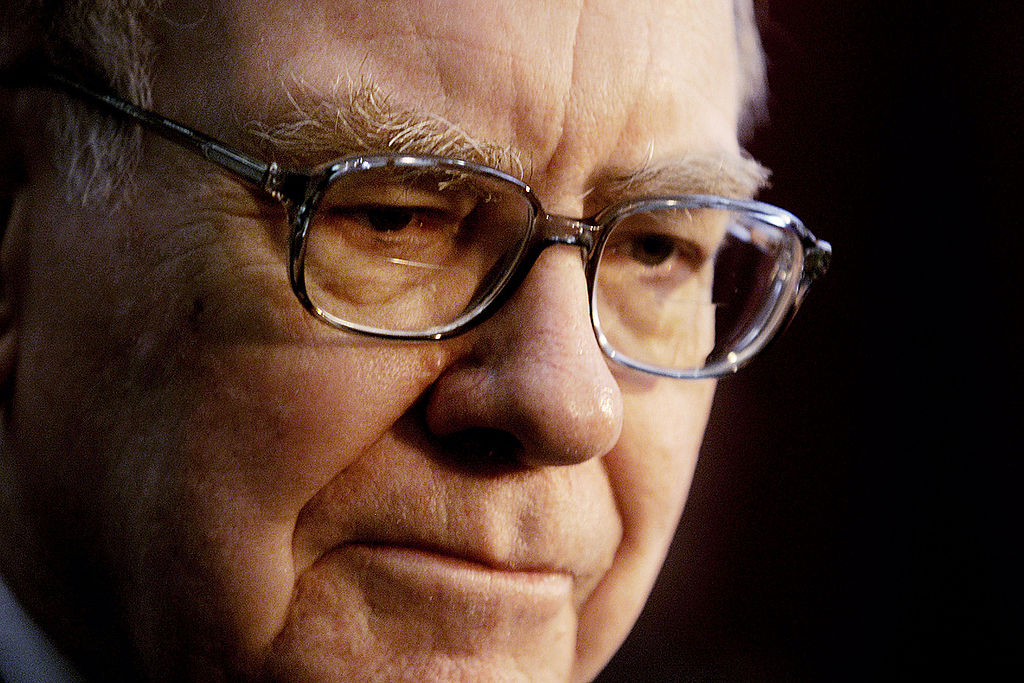Doubling Down on a Falling Stock
Buying more shares makes sense when nothing about a company has changed except the price of its stock.

Profit and prosper with the best of Kiplinger's advice on investing, taxes, retirement, personal finance and much more. Delivered daily. Enter your email in the box and click Sign Me Up.
You are now subscribed
Your newsletter sign-up was successful
Want to add more newsletters?

Delivered daily
Kiplinger Today
Profit and prosper with the best of Kiplinger's advice on investing, taxes, retirement, personal finance and much more delivered daily. Smart money moves start here.

Sent five days a week
Kiplinger A Step Ahead
Get practical help to make better financial decisions in your everyday life, from spending to savings on top deals.

Delivered daily
Kiplinger Closing Bell
Get today's biggest financial and investing headlines delivered to your inbox every day the U.S. stock market is open.

Sent twice a week
Kiplinger Adviser Intel
Financial pros across the country share best practices and fresh tactics to preserve and grow your wealth.

Delivered weekly
Kiplinger Tax Tips
Trim your federal and state tax bills with practical tax-planning and tax-cutting strategies.

Sent twice a week
Kiplinger Retirement Tips
Your twice-a-week guide to planning and enjoying a financially secure and richly rewarding retirement

Sent bimonthly.
Kiplinger Adviser Angle
Insights for advisers, wealth managers and other financial professionals.

Sent twice a week
Kiplinger Investing Weekly
Your twice-a-week roundup of promising stocks, funds, companies and industries you should consider, ones you should avoid, and why.

Sent weekly for six weeks
Kiplinger Invest for Retirement
Your step-by-step six-part series on how to invest for retirement, from devising a successful strategy to exactly which investments to choose.
My friend Al just bought more shares of Westport Innovations (symbol WPRT), a stock in which he had an 85% loss. His logic? “For just a few thousand dollars, I can cut my cost basis in half.” Al was practicing a technique known as averaging down, in which an investor buys more shares after a price decline on the theory that if you like a stock at, say, $40, you’ll love it at $20.
Westport is working on systems to allow trucks to run on natural gas, but fleet owners have yet to find the economics of its offerings compelling. That’s why over the past three years the stock has plunged from $47 to less than $4. In fact, it has fallen 14% since Al bought his additional shares.
Al was averaging down for the wrong reason. Instead of seeing the drop in Westport’s price as a great opportunity for realizing a loss for tax purposes, he was desperate to get even on his investment—and willing to put even more money at risk to do so. If you average down to avoid copping to an investment mistake, you are compounding your error.
From just $107.88 $24.99 for Kiplinger Personal Finance
Become a smarter, better informed investor. Subscribe from just $107.88 $24.99, plus get up to 4 Special Issues

Sign up for Kiplinger’s Free Newsletters
Profit and prosper with the best of expert advice on investing, taxes, retirement, personal finance and more - straight to your e-mail.
Profit and prosper with the best of expert advice - straight to your e-mail.
Legg Mason’s Bill Miller, the onetime star fund manager, famously said that the investor with the “lowest average cost wins.” But if investing were so simple, we’d all be drowning in money. That’s because companies change, and they don’t always meet investors’ expectations.
Consider Dell, a stock that helped make Miller famous. Dell was a monster performer for years, until competitors figured out its strategy and the growth of the personal-computer business slowed. Then Dell became the classic value trap. In July 2005, it traded at nearly $42. A year later, it was $22. Another year later, it was $29. Then $24. Then $13. Finally, on October 29, 2013, founder Michael Dell took the company private at $13.88 per share. You could have averaged down for eight years and lost a truckload of money, only to have Dell step in and decree, “Game over.”
In truth, sometimes averaging down works, and sometimes it doesn’t. It can work if you’re a really good stock picker or, to lower the bar a bit, simply a good conceptual thinker about stocks. Many of the great value investors—such as Warren Buffett and Marty Whitman, who launched the Third Avenue funds—have said that averaging down is a key strategic tool. Buffett hopes a stock will fall after he starts buying so he can buy more at a cheaper price. Whitman knows a stock is likely to go lower after he starts accumulating it because he usually buys when things look bleakest and he believes that the perception of the company won’t change overnight.
When it works. Averaging down makes sense under two circumstances. Do it when a great company has stumbled, but only if you’re pretty sure that the stumble doesn’t reflect a permanent reversal of fortune. Or average down when nothing about a company has changed except its share price.
I just took the latter approach with Adamis Pharmaceuticals (ADMP), a tiny firm that is seeking approval for new drug-delivery systems for the allergy- and respiratory-medication markets. I paid $5 a share after learning about Adamis in a newsletter. Once I bought, the stock went down relentlessly for nearly three months, eventually hitting $3.82. I bought more at $3.90 per share and a lot more at $4.10. Now my cost basis is $4.60, and the stock is at $5.60 (as of January 9). Just like that, averaging down has turned a tidy gain into an even bigger profit. What a strategic tool!
Of course, the story is far from over. I don’t know how the investment will ultimately turn out, but I am certain that it made sense to buy more shares after the stock had crumbled 24% from my purchase price. I’m confident because the company’s value hadn’t changed, only its share price.
Profit and prosper with the best of Kiplinger's advice on investing, taxes, retirement, personal finance and much more. Delivered daily. Enter your email in the box and click Sign Me Up.

-
 Quiz: Do You Know How to Avoid the "Medigap Trap?"
Quiz: Do You Know How to Avoid the "Medigap Trap?"Quiz Test your basic knowledge of the "Medigap Trap" in our quick quiz.
-
 5 Top Tax-Efficient Mutual Funds for Smarter Investing
5 Top Tax-Efficient Mutual Funds for Smarter InvestingMutual funds are many things, but "tax-friendly" usually isn't one of them. These are the exceptions.
-
 AI Sparks Existential Crisis for Software Stocks
AI Sparks Existential Crisis for Software StocksThe Kiplinger Letter Fears that SaaS subscription software could be rendered obsolete by artificial intelligence make investors jittery.
-
 What Made Warren Buffett's Career So Remarkable
What Made Warren Buffett's Career So RemarkableWhat made the ‘Oracle of Omaha’ great, and who could be next as king or queen of investing?
-
 With Buffett Retiring, Should You Invest in a Berkshire Copycat?
With Buffett Retiring, Should You Invest in a Berkshire Copycat?Warren Buffett will step down at the end of this year. Should you explore one of a handful of Berkshire Hathaway clones or copycat funds?
-
 Stocks at New Highs as Shutdown Drags On: Stock Market Today
Stocks at New Highs as Shutdown Drags On: Stock Market TodayThe Nasdaq Composite, S&P 500 and Dow Jones Industrial Average all notched new record closes Thursday as tech stocks gained.
-
 9 Warren Buffett Quotes for Investors to Live By
9 Warren Buffett Quotes for Investors to Live ByWarren Buffett transformed Berkshire Hathaway from a struggling textile firm to a sprawling conglomerate and investment vehicle. Here's how he did it.
-
 A Timeline of Warren Buffett's Life and Berkshire Hathaway
A Timeline of Warren Buffett's Life and Berkshire HathawayBuffett was the face of Berkshire Hathaway for 60 years. Here's a timeline of how he built the sprawling holding company and its outperforming equity portfolio.
-
 Berkshire Buys the Dip on UnitedHealth Group Stock. Should You?
Berkshire Buys the Dip on UnitedHealth Group Stock. Should You?Buffett & Co. picked up UnitedHealth stock on the cheap, with the embattled blue chip one of the newest holdings in the Berkshire Hathaway equity portfolio.
-
 What Set Warren Buffett Apart
What Set Warren Buffett ApartAs Warren Buffett prepares for retirement, we reflect on what we've learned from his 60 years of leadership at Berkshire Hathaway.
-
 Value vs Growth Investing Isn't So Simple
Value vs Growth Investing Isn't So SimpleThe difference between growth and value stocks isn't black and white.